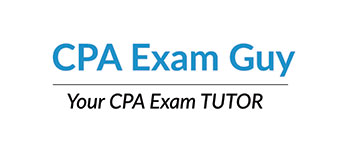
The CIA exam is not one to be taken lightly. If you’re a student who meets the minimum requirements for taking it, it’s likely to be like no other test you’ve ever taken in your educational career.
With an intimidatingly low pass rate of around 40%, the possibility of failure is very real.
Scared? Don’t be.
There are many resources available for students looking to pass the CIA exam and begin their careers as internal auditors. Additionally, many tips and strategies can be used to maximize their chances of success. For the sake of the nervous, here are my top 5 CIA exam study tips, resources, and strategies to give you the edge to CRUSH the CIA exam!
CIA Exam Tip #1 – Identify Your Learning Style

One popular theory regarding the nature of education is the multiple intelligence theory coined by the psychologist Howard Gardner. This theory claims that intelligence can manifest in different ways that can vary from person to person. Depending on how their intelligence manifests itself, the individual will be more receptive to knowledge if it is presented in a manner that relates to their form of intelligence.
Confused? Let me explain:
For example, a person with linguistic intelligence learns best through language and will learn best when information is spoken or written to them clearly. These individuals will get the most out of listening to lectures or reading from extended passages. Someone with interpersonal intelligence retains knowledge through communicating with other people and will learn best in a discussion-heavy study group.
The first step toward studying effectively for the CIA exam, or any major test for that matter, is to identify your own intelligence. Do you understand and remember complex ideas if they are spoken to you in clear language, or do you have an easier time breaking it down into a logical system? Do you learn best in a group setting or while studying on your own? Figuring this out before enrolling in an educational program can save a lot of time and money that could otherwise be wasted on an ineffectual educational program.
Tip #2: Use Great CIA Study Materials
Once you’ve figured out the way in which you can study most effectively, the next step is to find a program or tool that teaches you in this manner. When it comes to CIA exam prep courses, there are a plethora of choices available to students with many different features. Thanks to this diversity in study content, you’re bound to find a program that suits your learning style.
Here are a few CIA review course suggestions:
- Students who have linguistic intelligence tendencies will appreciate Gleim’s CIA exam prep courses due to their high volume of video and audio lectures.
- Students who showcase logical or mathematical intelligence will prefer Wiley CIAexcel since it offers many different charts, graphs, and diagrams that break down exam concepts into simple formulas.
- Intrapersonal intelligence students, meaning students that learn best on their own, will get the most out of Surgent’s CIA course thanks to its focus on self-study backed by powerful adaptive learning tools.
Tip #3: Simulate the CIA Exam Experience
In addition to learning the information tested on the CIA exam, you should also focus on familiarizing yourself with the experience of taking the exam. One of the most debilitating factors that can negatively affect your score on any test is anxiety due to feeling lost or overwhelmed.
Fortunately, many of the most popular CIA study programs offer realistic simulations of the exam that use similar questions and have a similar time limit. If you signed up for a program that doesn’t offer simulated exams, don’t worry! It’s easy to find cheap and free practice tests online. In order to get the most out of this step, try to imitate the test-taking environment down to the last detail by setting up your study space in a similar fashion to an official test center.

CIA Prep Tip #4 – Take Lots of Breaks
Once you’ve figured out your learning style, enrolled in a program that complements it, and figured out a way to acclimate yourself to the exam experience, it’s time to start studying. Before you get too deep into a study session, however, it’s extremely important to set aside time to take short breaks.
Some general principles outlined by Oregon State University that ensure an effective break is to schedule them ahead of time, usually after about an hour of uninterrupted studying. It’s a good idea to change your environment when taking a break, and it’s also more effective if you engage in some light physical activity. For these reasons, an effective break habit is to take a short walk outside.
Just as important to your ability to both study correctly and retain all information learned is to maintain a proper sleep schedule. Studies conducted by the Harvard Medical Department show that a good night’s sleep can help your brain to process information and then store it as memories. Failing to sleep regularly can impair your brain’s ability to remember information, so try to avoid pulling all-nighters if you can.
Tip #5: Relax Before Taking Your CIA Exam
Once you’ve put in the hours studying effectively, interspersing your study sessions with frequent breaks and punctuating them with a good night’s sleep, there’s one more important step to take before exam day:
Relax.
If you’ve followed the rest of the steps in this article, you are well-equipped to handle anything the CIA exam can throw at you. Now, the only thing that can get in the way of you and the title of Certified Internal Auditor is last-minute jitters.
On the last few days before the exam, focus on decompressing and relieve any stress that has built up during the study process. Listen to music, watch a movie, or talk to a friend. It can be helpful to perform some stress relieving exercises such as Yoga or to engage in mindful meditation. It may seem silly, but a calm mind has a much greater chance at success than a stormy one.
Hopefully these tips will help you on your journey to become a Certified Internal Auditor. If you’re interested in reading more about study tips and reviews of CIA prep courses, we’ve got lots more helpful articles just like this one. Good luck!
